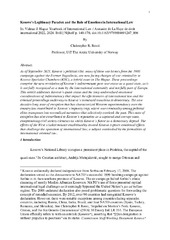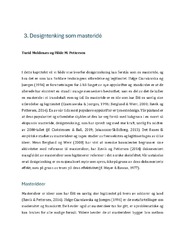Artikler, rapporter og annet (samfunnsvitenskap): Nye registreringer
Viser treff 1-20 av 313
-
Return of the Groβraum and the Proper Security Crisis of Rising Arctic Tension. Special Online Issue, 46 University of Pennsylvania Journal of International Law (Special Issue), 47-68 (2025).
(Journal article; Tidsskriftartikkel; Peer reviewed, 2025)This article adopts a spatial approach to understanding geopolitical events in the Arctic. It is sensitive to emerging securityscapes that cannot disentangle from broader global implications of Russia’s aggression against Ukraine. A melting Arctic is reshaping the liner boundaries that define membership within its historically closed circumpolar polity; however, the international legal challenges ... -
Makro-deliberasjon i lokalpolitiske debatter
(Journal article; Tidsskriftartikkel, 2025-01-30)Denne artikkelen setter søkelys på deliberativt demokrati i samfunnsdebatten gjennom å belyse ulike arenaer hvor et lokalt vekst/vern-problem diskuteres i forbindelse med utbyggingen av et større reiselivsanlegg, Arctic Center i Tromsø. Formålet er å finne ut i hvilken grad ulike arenaer ivaretar sentrale deliberative elementer, hvordan arenaene virker i forhold til hverandre, og hvordan de kan ... -
Fylkestingsvalget 2023 – et reverseringsvalg?
(Chapter; Bokkapittel, 2025-06-15)The 2023 Norwegian regional election marked a pivotal shift in regional politics, witnessing the Labour Party’s decline as the Conservative Party for the f irst time becoming the largest political party with 25.5 per cent of the national vote. After a reversal of the reform of the county structure, 14 separate county elections were held, coinciding with the re-establishment of several counties. ... -
Sentrum og periferi i samepolitikken: En analyse av geografiske skillelinjer blant samiske velgere
(Chapter; Bokkapittel, 2025-05-31)Geography and its territorial implications have increasingly shaped elections in Norway and internationally. This chapter explores whether Sami politics also exhibits a territorial dimension, drawing on Rokkan’s cleavage theory to analyze urban–rural and center–periphery divides, with a focus on how geography influences political trust and support for Sami self-determination. While overall geographical ... -
Nordkalottfolkets gjennombrudd ved sametingsvalget i 2021: En ny type utfordrerparti vokser fram
(Chapter; Bokkapittel, 2025-05-31)The most significant change resulting from the 2021 Sámi parliamentary election was the increase, from 6.6 percent to 18.3 percent, in votes for the political party, People of the North Party (NKF). Since the election in 2021, the NKF has become a counterforce to the dominant Sámi political thinking. The party is against strong boundary building between the Sámi, Kvens and Norwegians in the north. ... -
Arbeiderpartiets rolle i samepolitikken: Fra styringsparti til mellomstort parti
(Chapter; Bokkapittel, 2025-05-31)From having been a significant force and the largest party in the Sami parliamentary election in 2009, the Labour Party (Arbeiderpartiet) slipped during the 2021 election from its position among the largest parties and now stands as a medium-sized party with 15 percent of the vote. This chapter employs a combination of qualitative interviews with politicians and a larger survey to elucidate this ... -
Internal cleavages and changing party system in indigenous politics – The Sámi Parliament of Norway
(Journal article; Tidsskriftartikkel, 2025)Indigenous politics is different from “normal” politics. It is about power within the state and against the state in which fragmentation is commonly seen as fragility. Political party competition is therefore extremely rare, and interests’ rep resentation is generally not organized through political parties. In this article, we analyze a unique and deviant case – Norway – where Indigenous ... -
Norske Samers Riksforbund sin dominerende rolle i samepolitikken – i endring og under press
(Chapter; Bokkapittel, 2025-05-31)The Norwegian Sami Association (NSR) has dominated Sámi politics since the establishment of the Sámi Parliament in 1989. NSR has often been the leading party, shaping the political agenda and forming most of the Executive Councils of the Sámi Parliament (‘governments’). This dominance, characterized as the dominant party in a two-party system, has been challenged recently by the emergence of the ... -
Ideelle velferdsorganisasjoners særtrekk, merverdi og impact (SMI)
(Research report; Forskningsrapport, 2025)Denne forskningsrapporten presenterer funnene fra en omfattende studie av ideelle organisasjoners særtrekk, merverdi og impact (samfunnseffekt) innen helse- og sosialsektoren.<p> <p>Forskningsprosjektet har tatt utgangspunkt i to hovedspørsmål: <ol> <li> Hva er ideelle tjenesteleverandører på helse- og sosialfeltet sine særtrekk, merverdi og impact?</li> <li> Hvordan forske på ideelle tjenesteleverandører ... -
Fellesskap på norsk: Frihetens demokratisering og den norske modellen
(Chapter; Bokkapittel, 2024-06-25)I Norge står fellesskap sterkt som ideal. Når norske samfunnsmedlemmer møter utfordringer som koronaepidemi, finanskrise, eldrebølge, økende sosial ulikhet og miljøtrusler, er det «fellesskapet» som er truet. Og når de skal løse problemer, er det gjerne «fellesskapet» som skal stille opp. Men hva med fellesskap som realitet. Finnes det et norsk fellesskap? Eller er det bare ideologisk retorikk og ... -
Kosovo’s Legitimacy Paradox and the Role of Emotions in International Law
(Chapter; Bokkapittel, 2024)As of September 2021, Kosovo’s political elite, many of them war heroes from the 1998 campaign against the Former Yugoslavia, are now facing charges of war criminality at Kosovo Specialist Chambers (KSC), a hybrid court in The Hague. These proceedings comprise the next revolution of Kosovo’s indeterminate post-war status as a quasi-state, as it is not fully recognised as a state by the international ... -
Kartlegging av praksis i motsegnssaker
(Research report; Forskningsrapport, 2024-12)Norsk lov gir kommunane stor autonomi i å forme si eiga utvikling, men stillar samtidig krav om å ivareta nasjonale og regionale interesser. Dette krev samarbeid og balanse mellom lokale behov og eit breiare samfunnsomsyn. Planlegging, både samfunnsplanlegging og arealplanlegging, er viktige verktøy for å utvikle lokalsamfunna. Motsegnsinstituttet er eit viktig verkemiddel for å sikre at nasjonale ... -
Perspective Chapter: The Effects of Social Media on Local Democracy
(Chapter; Bokkapittel, 2024-08-13)This chapter discusses social media impact on local democracy and aims to provide knowledge about how social media impact politicians and political communication in local democracies. It discusses the special characteristics of social media, provides a brief overview of deliberative democracy values, and identifies what makes social media special in local politics. The empirical section examines ... -
Democratisation of the outdoors: how equipment lending is emerging in Norway’s sharing economy to provide sustainable consumption at the local scale
(Journal article; Tidsskriftartikkel; Peer reviewed, 2025-01-20)Outdoor equipment lending is emerging as a collaborative consumption practice in Norway’s sharing economy, potentially providing a solution to the adverse climate and environmental impacts connected with the country’s outdoor culture. Little is known, however, of how to upscale such practices when owning equipment is culturally embedded. This article contributes to an emerging literature on how ... -
Designtenking som masteride
(Chapter; Bokkapittel, 2024)I dette kapittelet vil vi både vise hvorfor designtenkning kan forstås som en masteride, og hva det er som kan forklare tenkningens utbredelse og legitimitet. Ifølge Czarniawska og Joerges (1996) er forutsetningen for å bli fanget av nye oppskrifter og standarder er at de allerede har eksistert en stund i mange menneskers bevissthet, som en del av det de kaller en masteride i et translokalt rom og ... -
Kvinner, hunder og polare bragder. Erfaringer fra hundekjøringsliv
(Chapter; Bokkapittel, 2024)Etappen fra Rohn til Nikolai finner sted nokså tidlig i det mer enn 1600 kilometer lange hundeløpet Iditarod, som har gått gjennom Alaska hvert år siden 1973. Det er på denne etappen spannene skal gjennom The Burns. I et videointervju fra 2012 forteller den norske hundekjøreren Sigrid Ekran om sin ferd gjennom denne sagnomsuste strekningen: <p> <p><i>Det er litt berykta ut av Rohn. Der kjører du ... -
Autonomous hunter-gatherer children in hierarchical schools: a review of the literature from the global South
(Journal article; Tidsskriftartikkel; Peer reviewed, 2024-09-20)We recently conducted a review of the literature regarding hunter-gatherer children’s schooling experiences in the global South (Ninkova et al 2024). In this research note, we highlight one central finding of our review: that the autonomy granted to hunter-gatherer children determines their participation in school. Children decide for themselves whether they will attend. Children also decide for ... -
Framing by opening up. Approaching matters of concern in nature based tourism
(Chapter; Bokkapittel, 2024)Nature-based tourism is imbued with ambiguities that tell of tourism as deeply intertwined in the development of places. Inspired by Krzywoszynska (2023) and Stirling’s (2008) idea of framing research by opening up, we argue for attending to nature-based tourism as an open relational historical-geographical phenomenon, to illuminate the grey zones of world-making in the place-tourism nexus. ... -
Geografisk rettferdighet for norske kommuner. Sosial ulikhet i det norske fellesskapet
(Chapter; Bokkapittel, 2024-06-25)Temaet til boken er det norske fellesskapet og hvorvidt det er robust eller resilient. I introduksjonen skriver Aakvaag og Bæck at robusthet kan defineres som evnen til å overleve og hente seg inn igjen etter utfordringer, kriser, press og andre former for sjokk. Hagen skriver i sitt kapittel at den norske modellen består eller faller sammen om forholdet mellom del og helhet og/eller individuell og ... -
Digitalisering og fellesskap i helsefeltet
(Chapter; Bokkapittel, 2024-06-25)I dette kapitlet drøfter vi hvilken betydning innføring og bruk av digitale teknologier har for hvordan fellesskap dannes, opprettholdes og løses opp i dagens samfunn. Siden alle tre kapittelforfattere jobber innen e-helse1, illustrerer vi kapitlet med eksempler hentet fra helsefeltet, både på individ-, organisasjons- og samfunnsnivå. Kapitlet drøfter pasienters og pårørendes deltakelse i ulike ...


 English
English norsk
norsk


















